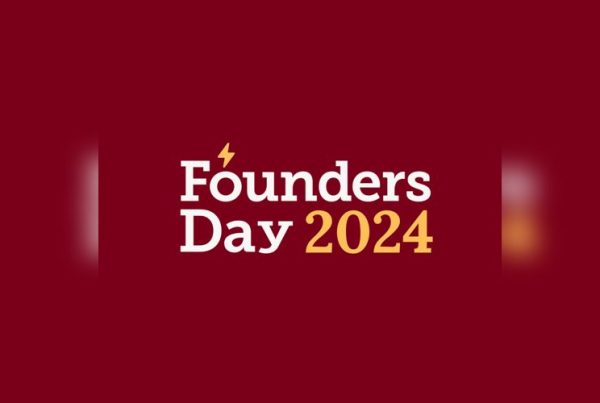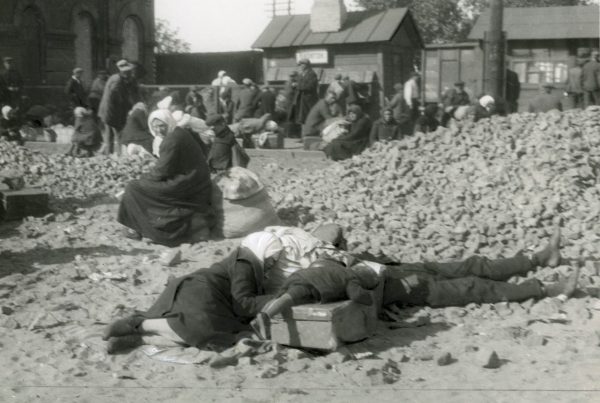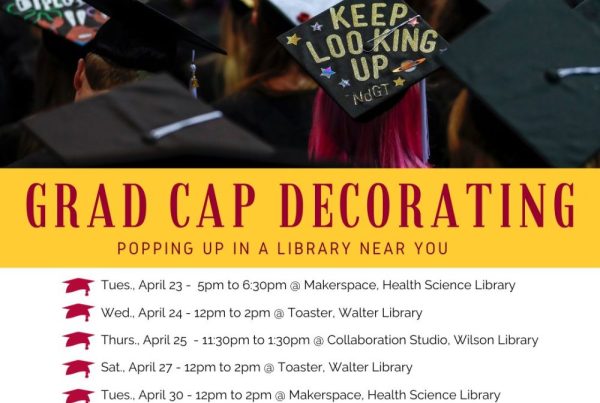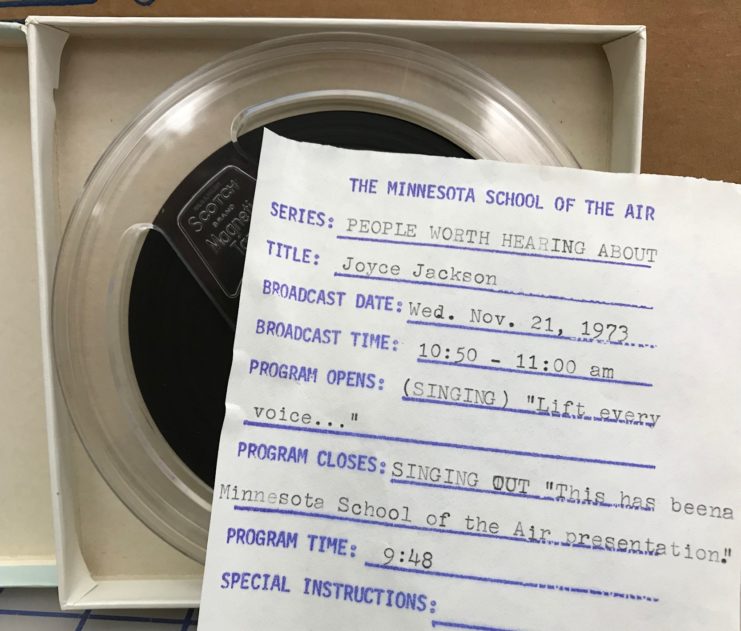
Minnesota School of the Air: People Worth Hearing About – Joyce Jackson. Broadcast date: November 21, 1973. Audio reel and cue sheet, tray 118, University of Minnesota Radio and Television Broadcasting records, ua01039, University Archives.
Season 3: Episode 3. Women on the Air: Joyce Jackson
Podcast (umnradio): Play in new window | Download
You are listening to U of M Radio on Your Historic Dial Podcast. Welcome to Season 3 Women on the Air: Episode 3 Joyce Jackson.
This is Rebecca from University Archives. In a previous episode, we introduced you to the Minnesota School of the Air series People Worth Hearing About, which originated on KUOM radio in 1969 with programs that featured biographies of prominent African Americans. The series later expanded to include persons who according to School of the Air director Betty Girling, “have – for the most part – been overlooked in the writings of our history, because they were non-white, or non-male…” The series began with profiles of historical figures told in the form of dramatization, where a voice actor played the figure and depicted a scene from their life, punctuated with musical transitions and sound effects. In subsequent seasons, School of the Air staff produced recorded interviews with living persons. This brings us to the featured historic broadcast for this episode, the November 21, 1973 program of People Worth Hearing About, an interview with Dr. Joyce Jackson, Principal of Central High School in Minneapolis.
In a July 1973 letter addressed to Jackson, Assistant Producer Walter Brody described the inspiration for this program:
“Dear Ms. Jackson,
This is the sixth school year that the Minnesota School of the Air has scheduled vignette biographies of outstanding minority Americans, on a daily basis, for in-school listening…
… Wherever possible, after the first year we stressed only historic personalities, we have tried to interlace historic figures with people living today, and with local people, in order that our listeners in Grades 4-5-6 learn that Minnesotans, too, have made, and are making, contributions of great value in their areas of specialization.
With “living” personalities, we usually try to arrange for a “live” interview, since the voice of the American so cited adds a level of understanding and appreciation for these Intermediate Gradesters, in addition to the timeliness and authenticity of whatever she or he may choose to say. We try to pick people each year who will give us as broad a range as possible, in occupations, age, experience, etc.
Your new position as principal of Minneapolis Central High School is one we feel to be of interest to the children at this level and will give them an opportunity to gain greater understanding of the role of a school principal. We hope you will accept our request to participate in an interview for this series…
… At the moment we are collecting data and preparing the Teachers’ Manual… We would appreciate it if you could send us a resume… From this we will construct… copy which will give the teachers using the series some idea in advance of the broadcast of your present responsibilities and past accomplishments…”[1]

Headline: Mrs. Joyce Jackson to Become Central High’s Principal. Undated newspaper clipping about Dr. Jackson found in a program folder, Box 16, Betty T. Girling papers, ua00192, University Archives.
The copy printed in the 1973-74 Teacher’s Handbook appeared in part, as follows:
“When Joyce Jackson received her M.S. in Special Education and Guidance from Southern Illinois University in 1952 the schools in that part of the country were still segregated. She decided to go where the schools would offer more opportunity. She came to Minneapolis where she was one of the few Black teachers in the school district. She hadn’t planned to stay more than a couple of years, but after six years of teaching… in primary and intermediate grades, she found herself teaching… in the school of which she would some day be principal… Minneapolis Central High.
In the early sixties Ms. Jackson branched out from her teaching specialites to do more counseling at Central High. She decided to pursue more education in that field and so she began to attend the University of Minnesota in the field of Counseling Psychology and Special Education. She received her Ph.D in 1969…
… On June 12, 1973 it was announced that Ms. Jackson had been appointed principal of Central High School. She assumed that position in September, 1973…. The first Black woman to be appointed principal of a high school in Minneapolis….”
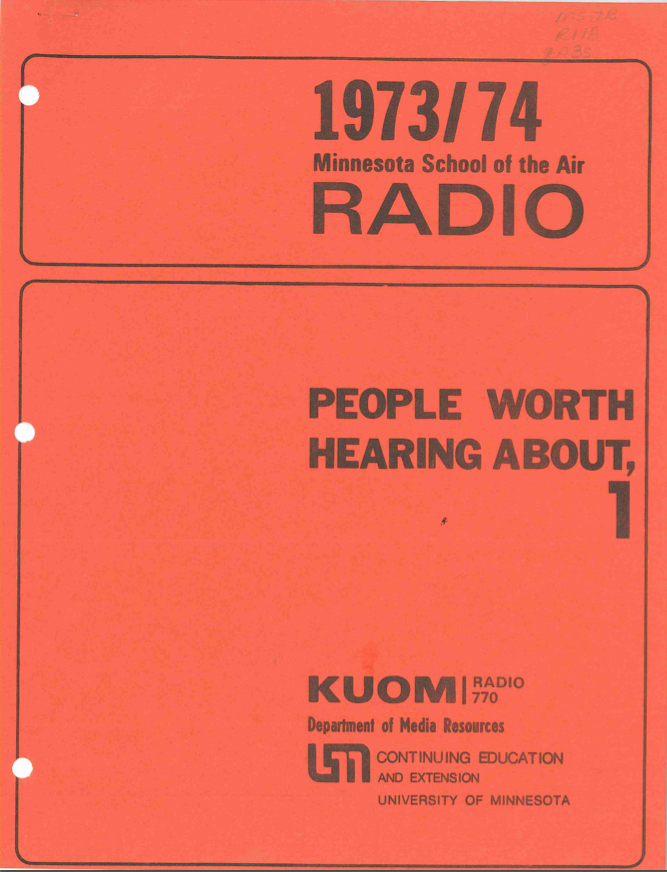
Cover of the People Worth Hearing About Teacher’s Handbook, Part 1: 1973-1974, Box 112, University of Minnesota Radio and Television Broadcasting records, ua01039, University Archives.
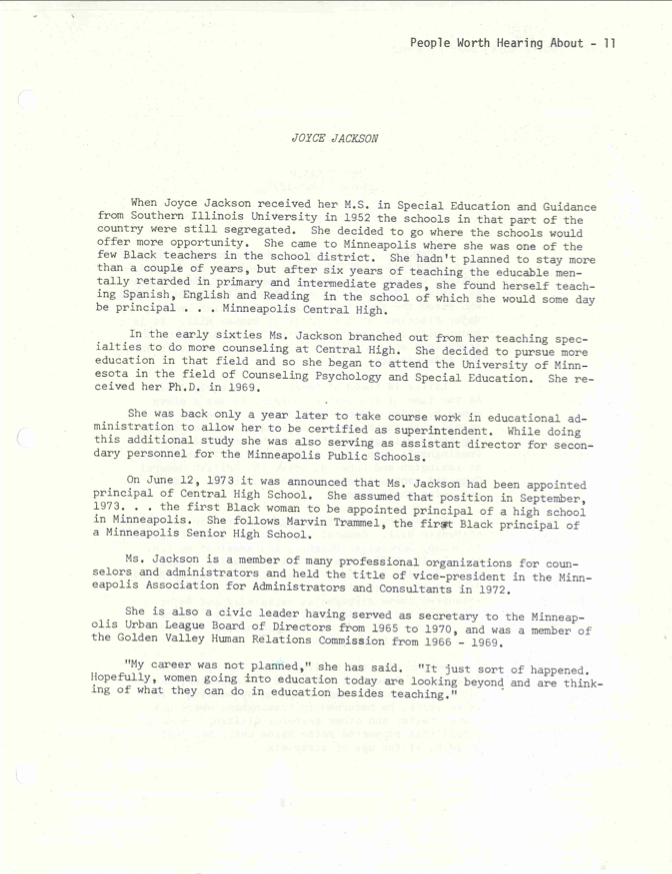
Page 11 from the People Worth Hearing About Teacher’s Handbook featuring Joyce Jackson, Part 1: 1973-1974, Box 112, University of Minnesota Radio and Television Broadcasting records, ua01039, University Archives.
Now that we’ve given some idea of Jackson’s background in advance, let’s listen as she described her experience as a teacher, counselor, and principal on the November 21, 1973 broadcast of People Worth Hearing About:
Broadcast Transcript
[Intro music; choir singing: “Lift every voice and sing… Till earth and heaven ring, Ring with the harmonies of Liberty…”]
Announcer: The Minnesota School of the Air presents People Worth Hearing About, a special impact series spotlighting the lives and work of outstanding Black Americans.
Walter Brody: This is Walter Brody talking to Dr. Joyce Jackson who is the new principal of Central High School in Minneapolis, and, uh, today on People Worth Hearing About we’re just going to try and find out what a principal does and how she feels about the job. What first brought you to Minneapolis?
Joyce Jackson: I came to Minneapolis after I received my master’s degree from Illinois because it was the once city I was able to get a job at, a teaching position at, in the type of situation I was looking for. In southern Illinois, where I went to school, most of the school systems were segregated, and there was a limit insofar as the positions available to Black persons because we were only allowed to teach in the Black schools. And Minneapolis offered an opportunity to teach in an integrated setting, or as it was at the school which I was assigned, there were no minority students at the time.
Brody: Uh-huh. Did you leave Illinois in anger or hope, or did that situation anger you in any way or…
Jackson: Yes it bothered me, but that was several years ago before there was as much awareness as there is now of racism and segregation. I was aware then, I guess most Black people were aware of it, but it was not nationally known, the oppression. And, I guess I was concerned because here I was with a master’s degree, and uh… in a specialized field… and positions just were not available in my field.
Brody: Despite all your education and so forth…
Jackson: Yes…
Brody: You were just being excluded.
Jackson: Yes.
Brody: What were you teaching, what was your specialty?
Jackson: It was special education for educable mentally retarded children. My undergraduate major had been in Spanish and English and after work in elementary schools I wanted to see if I could cope with the teenager, and so I wanted to transfer into the secondary level. There I was able to teach Spanish and English which had been my original preparation. Also, I was almost certified as a counselor and there was a federal act that provided for more counselors in schools. So, I was teaching at Central, and the principal of Central at that time, who was a woman, Miss Baron, encouraged me to become a counselor at Central, which I did.
Brody: So that, the uh, moving up, as it were, into more administrative tasks was a kind of a challenge to you that you accepted, would you say?
Jackson: Yes.
Brody: What are the rewards of the administrator?
Jackson: Well for me it’s being in daily contact with the teenage students because I feel… you know, they are the future. And right now I sort of have my finger on their pulse, and know how they’re thinking…
Brody: What are they thinking now, what is the mood?
Jackson: The mood of students is… seems to be getting more serious. They’re thinking more about the future, but I think they’re more serious now and not as willing to rebel just for a cause.
Brody: Uh-huh. If they rebel, it has to be for something more personal?
Jackson: I think it would be something they really believed in if they were to rebel. You know in the past few years on college campuses and high schools there has been turmoil and students demanding certain rights and the sit-ins and, you know, the interactions going on. They don’t seem to be in that mood now. I think that was just the mood of the 60s and the 70s now there is a whole new thing that they’re thinking about. And a lot of it is… I see a lot of concern from students on human rights, you know, rights for women, rights for minorities, rights for students, and human rights.
Brody: What should high school do for a student? What can they expect and what should they expect from their high school education?
Jackson: I see high school as a period of exploration. I don’t feel that students should be penned down to decide what they want to be, or what they’re working towards. I feel it should be just more of a broadness in that if they would like to go to college to make sure that they take the proper courses, or if they want to go to a vocational school to make sure that they take the proper courses. But, but for them may be to explore, we’re very heavy on career education at Central and we’re expanding that in giving students different options to try different occupational clusters. I think it’s a time period where they can learn competitiveness, particularly if they participate in sports or even debate. I think a high school should have many of those extracurricular activities to offer students. And they also get to know students from a broader background, and at Central, because we have students from all over the city, there’s a very diverse population there racially, socio-economically… different lifestyles represented. I would hope in high school they will learn an appreciation for each other as people.
Brody: Isn’t that one thing that the plans for integration hoped to accomplish, was bring together all those various social-economic factors to learn from each other?
Jackson: Yes. I think the research shows that students in an integrated situation, regardless of race, usually do perform better, that integration does not lower the achievement. And I think this prepares students for the real world. Central is 65% white and 35% minority, with the largest minority being Black. And I think for many of the students it has been their first opportunity to know on a personal basis either a student of a different race, or a different religion. We have so many religions also that our students belong to, are from a different… I guess you’d call it class, you know based on economics because there is the whole range from children whose income is below the poverty level to those that are very high.
Brody: Did you have any surprises now that you’ve been on the job, what 3 months, is it? Is the job… everything is what it was cracked up to be?
Jackson: Well, I’m working very hard. I don’t think I’ve had any surprises yet, except maybe in surprises in how responsible senior high students can be. And the fact that I’m working on that… I try to trust them, and trust them with responsibilities and work with them so that they know my main goal being there is to enhance their education. In a study that was done last year throughout the city, where students told how they felt about their school, the students at Central felt better about Central than any other group of students felt about their school in the city.
Brody: So you’re very proud of your school?
Jackson: Yes.
Brody: Well thank you, Dr. Joyce Jackson, principal of Minneapolis Central High School.
[Outro music; Choir: “Sing a song full of the faith that the dark past has taught us…”]
Announcer [above choir]: This has been another program in the series People Worth Hearing About, documenting the lives of outstanding Black Americans. The theme music, “Lift Every Voice and Sing,” was specially recorded by the Zion Baptist Church of Minneapolis.
[Choir: “Facing the rising sun of our new day begun, Let us march on till victory is won.”]
Announcer: This has been a Minnesota School of the Air presentation.
End Broadcast Transcript
[1] Betty Thomas Girling papers, ua0192, Box 16, “People Worth Hearing About, 1973-1974.”
The broadcast is available at http://purl.umn.edu/251175.
About this podcast
The U of M Radio on Your Historic Dial podcast is produced by University Archives and Libraries Communications for your enjoyment. Subscribe or download on iTunes or GooglePlay so you don’t miss another moment of historic Minnesota radio.
Recordings were digitized in 2016 in part with funds provided by the State of Minnesota from the Arts and Cultural Heritage Fund through the Minnesota Historical Society.
—Rebecca Toov is the collections archivist for the University of Minnesota Archives.


